Here’s How You Fight, Based On Your Myers-Briggs® Personality Type
Have you ever gotten into an argument that felt so unproductive you wanted to rip your hair out? During verbal battles it can feel like the other party is totally blind to the “logical” or “reasonable” perspectives that you are bringing to the argument. Simultaneously, they may feel the same way about you, considering their perspective the one “right” perspective.
The way we fight can be influenced by our Myers-Briggs® personality types. Many of us can understand why a Thinker (T) and a Feeler (F) might clash. The Thinking type might appear to calculated and focused on logic, while the Feeling type might appear to driven by emotional concerns. But the truth is that fighting is usually more nuanced than that.

In today’s article, we’ll dive deeper into the cognitive functions that make up your Myers-Briggs® personality type. With a deeper understanding of how your brain works, you can more effectively grasp how this impacts your fighting style.
Not sure what your personality type is? Take our new personality questionnaire here. Or you can take the official MBTI® here.
Estimated reading time: 22 minutes
Table of contents
- What Are the Cognitive Functions?
- How You Fight, Based On Your Myers-Briggs® Personality Type
- Introverted Feeling (Fi) Personality Types
- Extraverted Feeling (Fe) Personality Types
- Introverted Thinking (Ti) Personality Types
- Extraverted Thinking (Te) Personality Types
- Introverted Intuitive (Ni) Personality Types
- Extraverted Intuitive (Ne) Personality Types
- Introverted Sensing (Si) Personality Types
- Extraverted Sensing (Se) Personality Types
- What Are Your Thoughts?
What Are the Cognitive Functions?
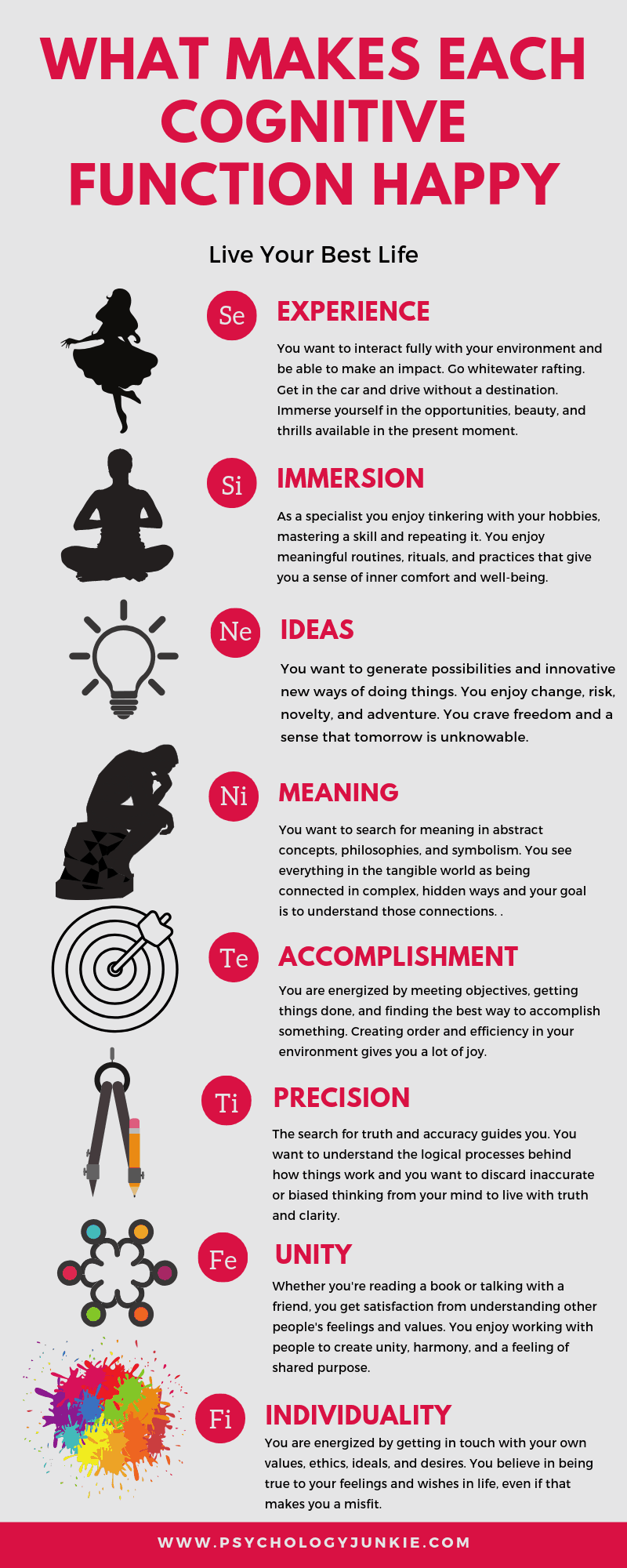
Not sure what we mean by “cognitive functions?” Have no fear! Cognitive functions are the eight cognitive processes that help us take in and process information. They can be broken down into four pairs of opposites, which we discuss briefly below. For more nuanced information on the cognitive functions you can read my article: The Cognitive Functions – What Are They?
Introverted Sensing (Si): This function focuses on past experience, internal sensations, and subjective impressions of details in the present. Compares and contrasts the present to memories and impressions from the past. Highly valued by Sensing-Judging (ISFJ, ISTJ, ESFJ, ESTJ) personality types.
Extraverted Sensing (Se): This function is focused on taking in and reacting to the immediate environment. It is concerned with exploring surroundings, noticing details, and understanding the physical world. Looks for relevant data in the moment. Highly valued by Sensing-Perceiving (ESTP, ESFP, ISTP, ISFP) personality types.
Introverted Intuiting (Ni): This cognitive function looks for underlying patterns, meanings, and visions of the future. It looks for hidden possibilities or potential outcomes that may occur. Highly valued by Intuitive-Judging (INFJ, INTJ, ENFJ, ENTJ) personality types.
Extraverted Intuition (Ne): This cognitive function focuses on the possibility for multiple interpretations of information, as well as potential futures. Seeks out possibilities and new perspectives. Highly valued by Intuitive-Perceiving (ENFP, ENTP, INFP, INTP) personality types.
Introverted Thinking (Ti): This cognitive function is focused on identifying logical patterns and categories in the present moment and then synthesizing them into a coherent understanding. Applies logic and seeks to understand the principles of how things or ideas work. Highly valued by Thinking-Perceiving (ISTP, INTP, ESTP, ENTP) personality types.
Extraverted Thinking (Te): This cognitive function focuses on taking in data from the physical world, organizing it, and then applying logical principles to it. Seeks out order and structure in the external environment. Highly valued by Thinking-Judging (ESTJ, ENTJ, ISTJ, INTJ) personality types.
Introverted Feeling (Fi): This cognitive function focuses on inner values and emotions and staying true to the self regardless of outside pressures. Focuses on what deeply matters on a personal level. Highly valued by Feeling-Perceiving (ISFP, INTP, ESFP, ENFP) personality types.
Extraverted Feeling (Fe): This cognitive function focuses on understanding the emotions of others and creating harmony in relationships. Seeks solidarity and connection. Highly valued by Feeling-Judging (ESFJ, ENFJ, ISFJ, INFJ) personality types.
These cognitive functions are what make up each of the 16 Myers-Briggs® personality types. Understanding how these different processes work can help us identify potential weaknesses and strengths when it comes to fighting. Knowing your own preferences, as well as those of the other party, can help you navigate heated conversations
How You Fight, Based On Your Myers-Briggs® Personality Type
Introverted Feeling (Fi) Personality Types
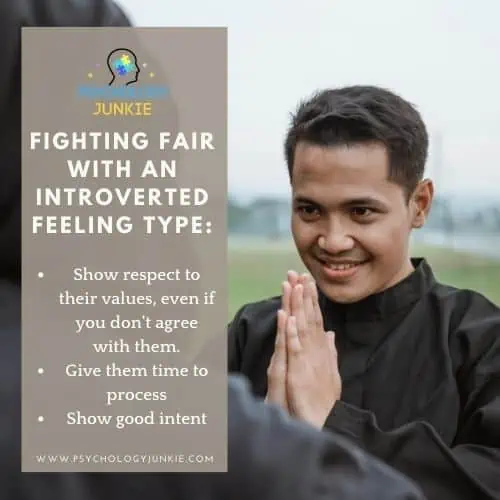
Which Personality Types Use Introverted Feeling?
Primary for Decision-Making:
ISFPs
INFPs
ESFPs
ENFPs
These Types Value Fi, but Have Less Certainty Around It:
ISTJs
INTJs
ESTJs
ENTJs
Let’s start with personalities that have Introverted Feeling (Fi) preferences. Individuals with Fi prioritize authenticity over harmony and strive to stay true to their core values regardless of external pressures. When it comes to conflicts, they tend to take an individualistic approach, planting their flag in the ground and refusing to bend to another person’s pressures. ISFPs and INFPs may simply shut down and tune out when fighting if they feel a value is threatened, deciding that it isn’t worth devoting their energy to. They may appear calm yet a fire is brimming on the inside. Alternatively, they may hold fast to what they believe is right with outward conviction. It can be difficult to dissuade them unless the other party shows clear respect to their underlying values and the emotions they are feeling in the situation.
ISFPs and INFPs believe in getting to the core of who someone is in a fight. If the motivations are bad, they will check out – refusing to waste their time on someone who has bad intent. Yet if they perceive that the opposing party has good intentions, they may be more patient and willing to listen. Ultimately, they will strive for a resolution that honors their core values and beliefs without trampling the values and beliefs of a good-willed opposing partner.
Introverted Feeling can result in a stubborn and rigid fighting style that is focused on maintaining individual integrity. Even TJ personality types who are known for their no-nonsense, logical perspectives can dig in their heels fiercely if one of their core values is at stake. They may look unimpressed and unmovable as someone tries to pressure them to change their stance on a value they hold dear. At the same time, TJs strive to focus on logic over their own feelings, and so they may get frustrated when fighting with someone who is taking things personally or getting emotional and losing sight of the facts of the situation.
How to fight fair with an Introverted Feeling Type:
- Show respect for their values and feelings, even if you don’t share them.
- Don’t pressure or try to manipulate them into changing their views or beliefs.
- Ask questions that help both of you get to the core of your differences so they can be addressed.
- Make sure you are arguing with good intent and not simply to argue, prove a point, get something, or “win.”
- Give them time to think through their responses. Don’t pressure them into a fast resolution.
- Apologize if you have diminished, belittled, or otherwise offended a core value of theirs.
Another article you might like: Here’s What Makes You Feel Vulnerable, Based On Your Myers-Briggs® Personality Type
Extraverted Feeling (Fe) Personality Types

Which Personality Types Use Extraverted Feeling?
Primary for Decision-Making:
ESFJs
ENFJs
ISFJs
INFJs
These Types Value Fe, but May Have Less Certainty Around It:
ESTPs
ENTPs
ISTPs
INTPs
Those with Extraverted Feeling (Fe) preferences value social harmony and interpersonal connection. They prioritize the needs of others and seek to maintain warm relationships. During conflicts, they tend to empathize and compromise in order to satisfy group needs. This can lead to a more conciliatory and accommodating fighting style that prioritizes group harmony over individual desires.
However, if the situation warrants it Fe types are not afraid to take a stand on an issue they believe in and fight for what is right. They will use their awareness of others feelings as both motivation and persuasion to rally people around a cause. This can be a powerful approach when combined with their natural warmth, which allows them to engage with potential allies and make peace with enemies.
In a fight, Feeling-Judging types will focus on how everyone is responding emotionally and the values of everyone in the situation. If they are strongly angered they may focus on how people have been affected or the group values at stake. They may also just vent their feelings, unloading their emotions in real time in an effort to understand them.
Thinking-Perceiving (TP) personality types also value Extraverted Feeling, but have less certainty around it. They tend to dislike conflict around values, but they enjoy a friendly argument or debate about intellectual matters. They may not always realize when the debate has shifted into unfriendly territory and may tease and troll thinking it’s all in good fun. Later on, they may be surprised to find that someone took something they said the wrong way. In a fight, they may appear detached and analytical or emotionally reactive; expressing their feelings and trying to make sense of them out loud.
How to fight fair with an Extraverted Feeling Type:
- Be tactful and considerate of their feelings and those of others involved.
- Don’t focus on the individual’s faults, but rather try to focus on values or goals that you can all agree on.
- Talk through your emotions in a non-accusatory way. Use “I feel” statements.
- Focus on understanding why people feel the way they do before jumping into solutions.
- Make sure everyone is heard and respected.
- If you have spoken harshly, raised your voice, or disrupted the peace, try to take a few moments to privately calm down before returning to the conflict.
- Understand that the Extraverted Feeling type might need to vent or talk out their feelings in order to make sense of them. They may come to different conclusions after they’ve had the space to fully express their feelings, so don’t nitpick what they’ve said while venting. Let them finish.
- Make sure your motives are to actually reach a positive solution for everyone. Don’t argue for the sake of it or to “win” without hearing the other person’s side.
Another article you might like: The Emotionally Intelligent Versions of Every Myers-Briggs® Personality Type
Introverted Thinking (Ti) Personality Types
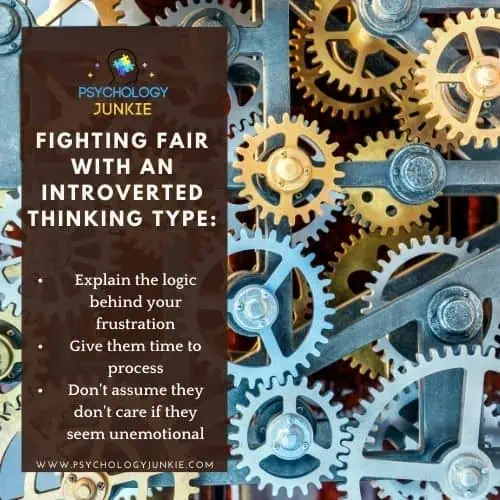
Which Personality Types Use Introverted Thinking?
Primary for Decision-Making:
ISTP
INTP
ESTP
ENTP
Value Introverted Thinking, But Have Less Certainty Around It:
ISFJ
INFJ
ESFJ
ENFJ
Individuals with Introverted Thinking (Ti) preferences highly value logic, understanding, and truth. They tend to detach emotionally from conflicts and approach them with a cool and rational mindset. This can often lead to a more calculated and deliberate fighting style that relies on reason rather than emotion to resolve conflicts.
TPs dissect an argument and attempt to understand the principles before proving their point of view. They strive for logical consistency and can become frustrated if they perceive any logical gaps or contradictions in another person’s views. FJs, on the other hand, may appear less argumentative but are still analyzing the situation critically – they just don’t always express their findings. This can make them appear more sympathetic and understanding but they are still striving for logical consistency. At other times, FJs can be so fixated on how people are feeling that they dismiss logical inconsistencies as “irrelevant” to the feelings of the people impacted.
In a fight, Ti types may come off as cold or even confrontational; focusing on the facts and reasoning out why something is wrong or misguided. They may also become frustrated if people don’t respond logically to their arguments which can lead to heated debates about rationality and accuracy.
How to fight fair with an Introverted Thinking Type:
- Take time to explain your points of view in a way that is logical. Even personal concerns or emotions can have a logical element, so be sure to bring those up.
- Don’t be dismissive of their opinions or logic. Realize that for the TP type, knowing the truth and being accurate is part of having integrity.
- Try not to make accusations that the Ti type is being “uncaring” by focusing on logic. Allow for time and space for them to process and think things through.
- Don’t jump to conclusions or make assumptions about the Ti type’s character based on their level of emotional engagement.
- Remember that even if a TP doesn’t outwardly express their feelings, they still exist. They just don’t trust their feelings to always be principled and sensible.
- If the TP gets overly-focused on accuracy and begin nitpicking, try to listen patiently. If it’s going on too long, try to remind them of the core principles or values that are trying to be resolved.
- Sometimes TPs will emotionally vent when they are very deeply stressed. Realize that they may feel differently after they’ve vented, so try not to take everything they say too literally. Give them time to process and ask clarifying questions once they’ve calmed down.
You might also like this article: Here’s How You Solve Problems, Based On Your Myers-Briggs® Personality Type
Extraverted Thinking (Te) Personality Types
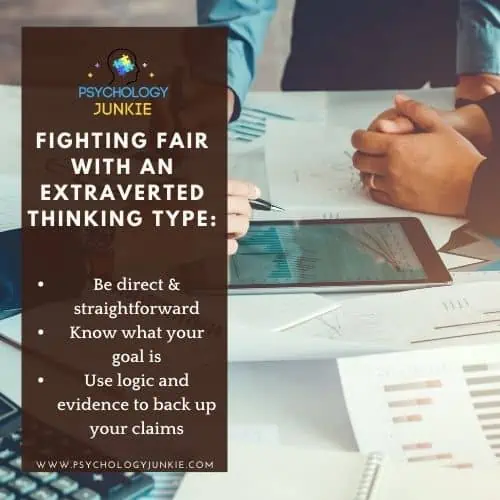
Which Personality Types Use Extraverted Thinking?
Primary for Decision-Making:
ESTJ
ENTJ
ISTJ
INTJ
Value Te, But Have Less Certainty Around It:
ESFPs
ENFPs
ISFPs
INFPs
Those with Extroverted Thinking (Te) preferences prioritize objectivity and efficiency when approaching conflicts. They tend to take charge and implement solutions quickly to resolve the issue at hand. During conflicts, they may come across as domineering and overly assertive, focusing on reaching a quick resolution rather than considering individual feelings. Solving the problem at hand is the goal of any conflict to the Thinking-Judging personality types. Why argue about something if you don’t actually want to fix it? That’s their frame of mind. If personally offended, TJ types (particularly ESTJs and ENTJs) may appear blustery and overwhelmed. If they’re severely stressed, they may be uncharacteristically emotional.
Feeling-Perceiving types also value Extraverted Thinking, but they feel less certainty around it. They appreciate solutions, but they first need to feel that their emotions and values are being respected and validated. During conflicts, they may take a more value-driven approach that focuses on creating understanding and expressing what they thought was right or wrong rather than pushing for an immediate resolution. Because FP personality types need space and time to assess their emotions, values, and stances on things, they may get annoyed at TJ types who want a very decisive, quick conflict with a clear resolution.
How to fight fair with an Extraverted Thinking Type:
- Acknowledge their goal of wanting to reach a resolution quickly and agree on what is most important to focus on first.
- If you become too emotionally charged, try not to take it out on them – the world of intense emotions can be overwhelming and confusing for them.
- Be direct about your feelings, while also being mindful of theirs. Don’t be afraid to be straightforward, even if it feels harsh. TJ types appreciate blunt honesty.
- If they become confrontational or dismissive of your values and emotions, take a step back and breathe. Tell them directly that you will not engage in argument if they cannot respect your feelings (even if they don’t agree with them).
- Try to set some ground rules in the beginning on both sides so each person feels heard and respected (i.e. no name calling, no talking over the other person).
- Don’t be afraid to stand your ground and fight for what you believe is right, while still listening to the other person’s perspective. Te types respect strength of conviction and argumentative skill.
- Understand that even if the TJ type seems detached and totally focused on logic, they also have a sensitive inner core. They probably feel things more deeply than they let on. Try to be patient and understanding when it comes to their feelings – even if they don’t outwardly express them.
Read This Next: The Survival Skills of Every Myers-Briggs® Personality Type
Introverted Intuitive (Ni) Personality Types
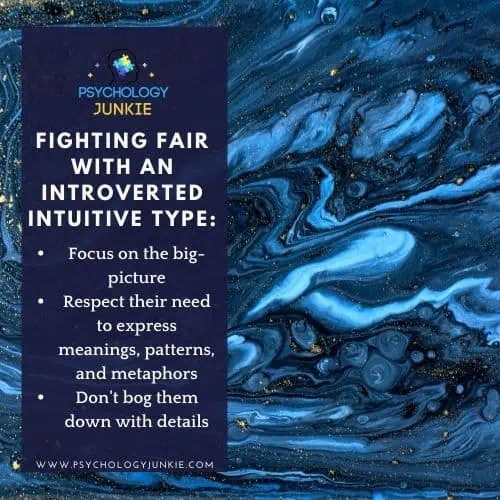
Which Personality Types Use Introverted Intuition?
Primary for Gathering Information:
INFJs
INTJs
ENFJs
ENTJs
Value Ni, But Have Less Certainty Around It
ISFPs
ISTPs
ESFPs
ESTPs
People with Introverted Intuitive (Ni) preferences value abstract thinking and creative problem solving. They thrive when they have the chance to explore their own personal theories and ideas about a situation. During conflicts, they may use symbolism or metaphors to express their views in order to help people better understand the bigger picture. In a fight, Ni types strive for an understanding of the overall system at play and may have difficulty articulating this without getting lost in abstract concepts. They may also become easily frustrated when someone isn’t able to grasp the deeper implications of their explanations.
SP personality types also value Introverted Intuition, but they feel less certainty around it. During conflicts, they are more likely to use examples, details, and facts to back up their claims instead of relying on patterns, underlying meanings, or metaphors. That said, they can get hunches or instincts during a fight and may be surprised to find that their gut feelings were accurate. At other times, those instincts and hunches may be part of a false pattern and lead them into more paranoia than useful thought.
How to fight fair with an Introverted Intuitive Type:
- Try not to get lost in the details – NJs prefer to look at the big picture and may struggle to hold onto a plethora of details.
- Be patient with their abstract language and let them know if you’re following along or are lost.
- Don’t be afraid to ask questions or share your interpretations of their ideas, as they appreciate people who can perspective-shift alongside them.
- Don’t brush off their insights or predictions simply because they haven’t already come to fruition. Many of their ideas take time to become reality, so try not to be too hasty with your judgments.
- Explain the long-term implications that concern you in the argument or disagreement.
- Give them time to process and ask clarifying questions once they’ve calmed down.
Read This Next: The Unique Mental Powers of the INFJ, INTJ, ENFJ, and ENTJ Personality Types
Extraverted Intuitive (Ne) Personality Types
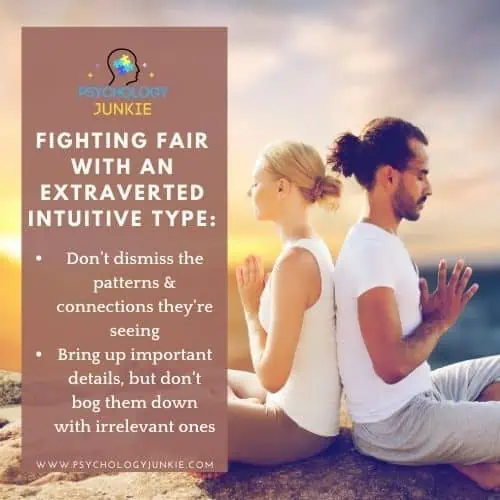
Which Personality Types Use Extraverted Intuition?
Primary for Information-Gathering:
ENFPs
ENTPs
INFPs
INTPs
Value Ne, But Have Less Certainty Around It:
ESFJs
ESTJs
ISFJs
ISTJs
People with Extraverted Intuitive (Ne) preferences are good at connecting seemingly unrelated ideas or events. They thrive on variety and enjoy exploring all possible angles of a situation. During conflicts they may take an exploratory approach, trying out different interpretations and theories until the problem is solved. In a fight, Ne types might be prone to getting overwhelmed and bouncing from one idea to the next without properly addressing each issue. They may see everything as connected and bring up a host of issues and explain how they’re all related.
SJ types also value Extraverted Intuition, but they feel less certainty around it. During a fight, they may focus on the facts and details in order to find a solution rather than relying on abstract speculation or theories. They prefer structure and practical applications of ideas. As a result, they may find strong Ne types overly imaginative or impractical if their ideas are not rooted in reality. At the same time, SJ types still value Extraverted Intuition and they may connect the dots between many disparate events or ideas that they’ve observed throughout their life. However, their certainty here is wavering. Because of this, sometimes they will have insights that are highly astute and other times their connections will be wildly off the mark.
How to fight fair with an Extraverted Intuitive type:
- Allow them to explore the possibilities of a situation.
- Try not to limit their creativity or imagination by cutting them off or dismissing their ideas without giving time for consideration.
- If you want to remind them of facts or “bring them down to earth” do so respectfully, knowing that their ability to spot patterns and connections is valuable.
- Don’t take everything they say as a personal attack – they may be simply trying out different theories in order to figure out the situation.
- Don’t bog them down with a lot of irrelevant details. Focus on facts that are relevant and point out big-picture concerns.
You Might Also Like: The Unique Intelligence of ENFPs, ENTPs, INFPs, and INTPs
Introverted Sensing (Si) Personality Types

Which Personality Types Use Introverted Sensing?
Primary for Information-Gathering:
ISFJs
ISTJs
ESFJs
ESTJs
Value Si, But Have Less Certainty Around It:
INFPs
INTPs
ENFPs
ENTPs
Those with Introverted Sensing (Si) preferences value their lived experiences, familiarity, and consistency. They are naturally observant and tend to remember past events or experiences that can help inform their current decisions. During conflicts they may focus on past details, experiences, or facts to illustrate why something is wrong or misguided. In a fight, Si types may struggle if the topic at hand involves new ideas or intuitive leaps, as they are more comfortable dealing with rules, experiences, or facts that are familiar and they have actual experience with. SJ types are also very linear when they fight; they need to explain the whole story or problem from the beginning. STJs will find ways to sum it up rapidly while SFJs might bring in a lot more detail. They will get frustrated if the other person in the argument keeps trying to rush them past the details.
NP types also value Introverted Sensing, but they feel less certainty around it. During a fight, NP types may haphazardly recall pieces of past events or experiences that can be helpful in the current situation. However, they can get flustered if they are forced to remember past events or data in detail as this is not a natural strength most of the time. The trouble is that they may have all the data locked away in their mind, but verbalizing it out on-the-spot and having to give a sequential, linear, detailed accounting of it can be difficult.
How to fight fair with an Introverted Sensing type:
- Allow them to draw on their past experiences and knowledge in the argument.
- Be patient with their recollection of details.
- Try putting yourself in their shoes and imagining how a past experience may be informing their current thoughts.
- Don’t discredit or overlook the knowledge they have gathered over time.
- Show respect for their traditions and values, even if you disagree with them.
- Try to express your argument in a linear, sequential fashion.
- Use facts to back up your assertions.
- Realize that if you are making judgments of them based on energy-reads or “vibes” they sill struggle to take you seriously.
You might also like: The Unique Intelligence of the ISFJ, ISTJ, ESFJ, and ESTJ Personality Types
Extraverted Sensing (Se) Personality Types
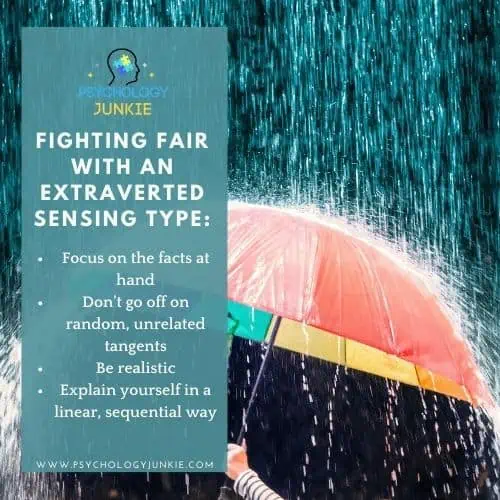
Which Personality Types Use Extraverted Sensing?
Primary for Information-Gathering:
ESFPs
ESTPs
ISFPs
ISTPs
Value Se, But Feel Less Certainty Around It:
ENFJs
ENTJs
INFJs
INTJs
People with Extraverted Sensing (Se) preferences focus on what’s relevant in the here-and-now. They thrive when they can quickly react to their environment, find immediate opportunities, and live on impulse. During conflicts they may focus on actionable solutions and tactics in order to bring about a resolution. They have a gift for staying focused on what’s relevant, bringing up important details, and taking action to move the situation in a positive direction. In a fight, Se types may get annoyed if their partner is fixating on abstract meanings, patterns, or future possibilities and not focusing on the actual, provable facts or events of the moment. Because ESTPs and ESFPs tend to be impulsive, they may lash out quickly in an argument or fight and then backtrack later if they realize they said something in the heat of the moment they hadn’t thought through.
NJ Types also value Extraverted Sensing, but they feel less certainty around it. They value relevance and facts, but they more deeply value the patterns and meanings they’ve gathered. During a fight, they may become frustrated if their partner is focusing on actionable solutions or quick fixes instead of taking the time to uncover the deeper reasoning behind the situation. They may also struggle to recall a lot of details in the heat of the moment, getting overwhelmed or losing track of facts only to remember them later when the fight is over. However, NJ types still value Extraverted Sensing and at times can wield it constructively in a conflict.
How to fight fair with an Extraverted Sensing type:
- Don’t go off on tangents if you can help it. Stay focused on the problem at hand.
- Be mindful of how their environment may affect their reactions or thoughts. If their environment is unsettling, they may struggle to verbalize their thoughts as well as they want to.
- Use facts to back up your assertions and try to be realistic.
- Explain yourself in a linear, sequential way.
- Use short stories or actual examples to express a concept or point.
- Realize that ESFPs and ESTPs tend to be impulsive and expressive. They may react quickly to situations, but later re-think what they said in the heat of the moment. If harsh words are spoken, give them time to cool off and tell them you need a break from the argument till you’ve both calmed down.
- Be mindful of their need for actionable solutions – if you can provide one that’s well thought-out, it may be a welcome relief.
You might also like: Here’s What It’s Like Inside the Mind of an ESFP, ESTP, ISFP, or ISTP
What Are Your Thoughts?
Did you enjoy this article? How do you fight fair according to your Myers-Briggs® Personality Type? Let us know in the comments! We’d love to hear your thoughts and experiences.
Find out more about your personality type in our eBooks, Discovering You: Unlocking the Power of Personality Type, The INFJ – Understanding the Mystic, The INTJ – Understanding the Strategist, and The INFP – Understanding the Dreamer. You can also connect with me via Facebook, Instagram, TikTok, or Twitter!









This article is very confusing. Stopped reading after a while.
This is a more advanced article to read, unless you have a lot of prior knowledge of what the article talking about, it can very much come across as confusing! This is not the type of article you can just read like something you’d find in a newspaper. All the advertisements make it even more confusing, but hey everyone has to suck a d*ck every now and then.
Shaun – ESTP